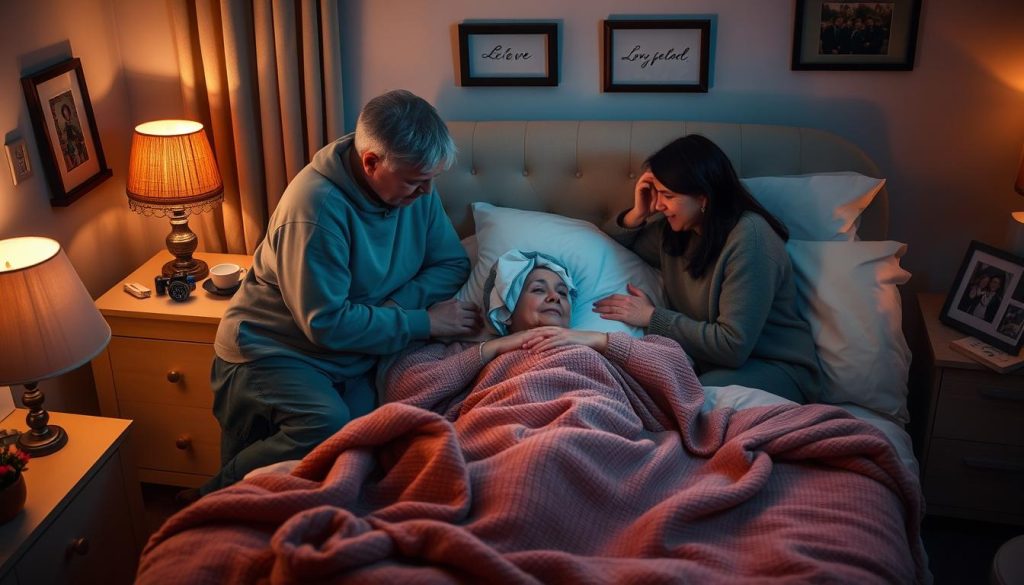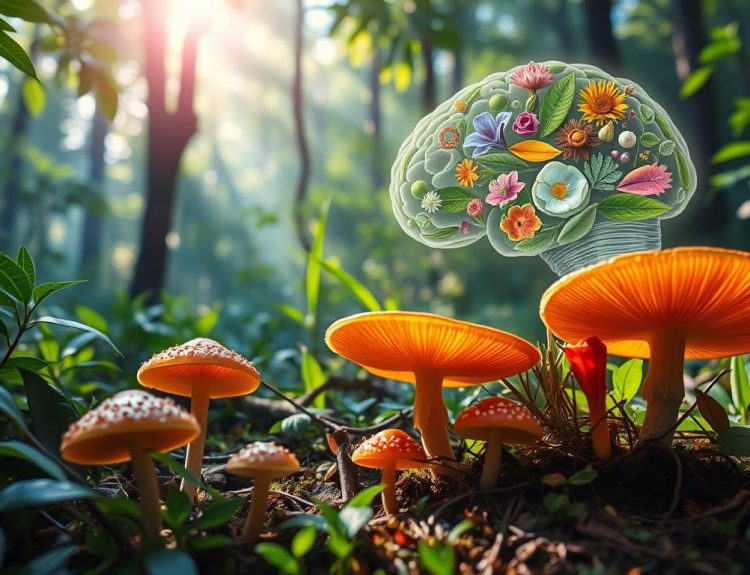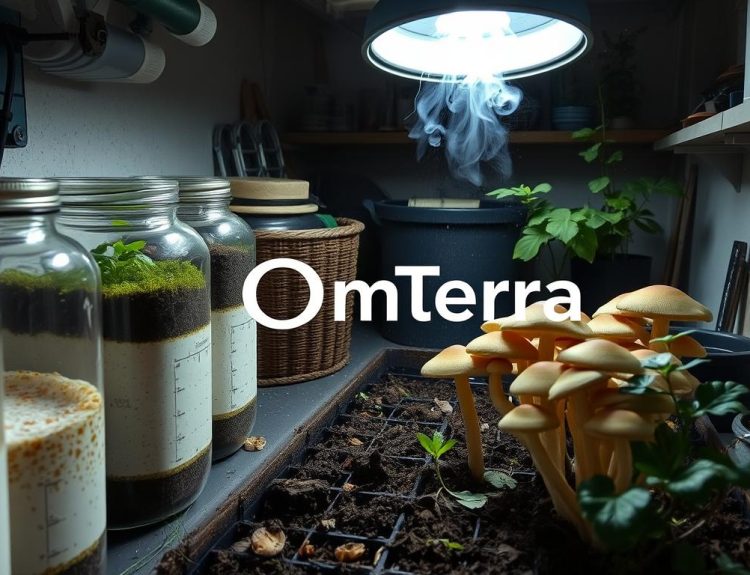In the United States, nearly 25% of terminally ill patients face severe anxiety and depression. This emotional pain can greatly reduce their quality of life. Yet, a new hope is emerging with psilocybin therapy, the active compound in “magic mushrooms.”
As a psychedelic therapist, I’ve seen the deep impact of psilocybin on those with terminal illness. It changes their consciousness and perspective. This allows them to face their fears, find life’s meaning, and find peace as death approaches.
In this article, we’ll dive into the science of psilocybin therapy and its role in end-of-life care. We’ll look at the research supporting it and the practical steps of treatment. We’ll also tackle common myths and stigmas around psychedelic therapy. By the end, you’ll understand how psilocybin therapy can bring comfort, meaning, and acceptance to those nearing the end of life.
Key Takeaways
- Psilocybin therapy shows promise in alleviating end-of-life anxiety and depression in terminally ill patients
- The treatment induces a shift in consciousness that allows patients to find peace and meaning as they approach death
- Current research supports the efficacy and safety of psilocybin therapy in end-of-life care
- The therapeutic process involves preparation, a guided psilocybin session, and integration aftercare
- Addressing misconceptions and collaborating with healthcare providers is crucial for integrating psilocybin therapy into palliative care
The Promise of Psilocybin in End-of-Life Care
The field of psychedelic research is growing fast. Psilocybin, found in magic mushrooms, is showing great promise. It helps reduce anxiety and existential distress in those facing the end of life.
Studies at places like Johns Hopkins University and NYU have shown psilocybin’s power. It helps lower depression and anxiety in people with serious illnesses. This has opened up new ways to use psilocybin in end-of-life care.
A study in the Journal of Psychopharmacology found psilocybin’s benefits. A single dose greatly reduced anxiety and depression in cancer patients. The effects lasted long, improving their quality of life and sense of meaning.
“Psilocybin therapy has the potential to transform the way we approach end-of-life care, offering a compassionate and effective alternative to traditional treatments.” – Dr. Charles Grob, Professor of Psychiatry at UCLA
Psilocybin does more than just reduce symptoms. It leads to deep psychospiritual exploration. Patients find peace and acceptance, which also benefits their loved ones.
Psilocybin therapy is a holistic approach. It addresses the mind, body, and spirit. This unique method offers a pathway to healing and wholeness.
| Institution | Study Focus | Key Findings |
|---|---|---|
| Johns Hopkins University | Psilocybin for depression and anxiety in cancer patients | Significant reductions in symptoms, improved quality of life |
| NYU | Psilocybin-assisted psychotherapy for existential distress | Decreased anxiety and depression, increased spiritual well-being |
| UCLA | Psilocybin for end-of-life anxiety | Rapid and sustained symptom relief, enhanced quality of life |
Research keeps showing psilocybin’s safety and effectiveness. It’s clear that psilocybin could change palliative treatment and hospice care. By adding psilocybin to end-of-life care, we can offer a new, transformative option. It honors the humanity of patients and helps them transition peacefully.
Understanding End-of-Life Anxiety and its Impact on Quality of Life
As people near the end of their lives, they face unique emotional challenges. This is called end-of-life anxiety. It’s filled with fear, uncertainty, and deep distress about dying and what comes next.
Defining End-of-Life Anxiety
End-of-life anxiety, or death anxiety, is a complex emotional state. It happens when people think about their own death. It involves worries about dying, both physically and spiritually.
Symptoms and Manifestations of End-of-Life Anxiety
End-of-life anxiety shows up in many ways. It can affect both emotions and the body. Some common signs include:
- Persistent feelings of fear and apprehension
- Difficulty sleeping or concentrating
- Increased irritability and mood swings
- Withdrawal from social interactions
- Somatic complaints, such as headaches or stomach discomfort
These symptoms can really hurt someone’s quality of life. It makes it hard to find peace and comfort in their final days.

The Emotional and Psychological Toll on Patients and Families
End-of-life anxiety affects not just the person feeling it but also their loved ones. Family members often feel overwhelmed while trying to support their dying relative. This can really hurt the emotional well-being of both patients and families.
“The fear of death follows from the fear of life. A man who lives fully is prepared to die at any time.” – Mark Twain
The table below shows the main differences between general anxiety and end-of-life anxiety:
| General Anxiety | End-of-Life Anxiety |
|---|---|
| Often related to everyday stressors | Specifically related to the process of dying |
| Can be managed with various coping strategies | Requires specialized support and interventions |
| May not have a significant impact on overall quality of life | Can greatly diminish quality of life in the final stages |
Dealing with end-of-life anxiety needs a wide range of approaches. This includes emotional support, spiritual guidance, and special therapy. Understanding this anxiety and its effects helps healthcare providers. They can then work to reduce existential distress and improve quality of life for those nearing the end of their journey.
The Science Behind Psilocybin Therapy
Psilocybin, found in magic mushrooms, is getting a lot of attention in neuroscience. It might help people with end-of-life anxiety. Studies are showing how it works in the brain, giving hope to many.
How Psilocybin Works in the Brain
Psilocybin’s benefits come from its interaction with serotonin receptors. When you take it, it turns into psilocin. This psilocin then binds to serotonin receptors, especially the 5-HT2A type.
This binding causes a series of chemical changes. These changes affect mood, how we see things, and how we think. It’s like a reset button for the brain.
Psilocybin also affects the default mode network (DMN). The DMN is active when we think about ourselves a lot. For those with end-of-life anxiety, this can lead to negative thoughts and feelings. Psilocybin seems to calm the DMN, helping to stop the cycle of anxiety.
The Therapeutic Potential of Psilocybin
Psilocybin helps the brain change and grow new connections. This is called neuroplasticity. It can help people change their thinking and see things in new ways.
Psilocybin also leads to mystical experiences. These are deep feelings of unity and spiritual connection. These experiences can lead to lasting positive changes in how people think and act.
As scientists learn more about psilocybin therapy, it’s clear it has a lot of potential. It could greatly improve the lives of those facing terminal illness.
Psilocybin and End-of-Life: A Promising Combination
When people near the end of their lives, they face big questions and tough emotions. Psilocybin therapy is showing promise in helping those with terminal illnesses. It helps them find peace and acceptance by exploring their inner selves and making sense of their lives.
Psilocybin, found in magic mushrooms, can lead to deep, lasting changes. For those nearing the end, it can help them face death with a new sense of purpose. It connects them to something bigger than themselves.
Psilocybin therapy helps patients review their lives deeply. They reflect on their experiences, relationships, and achievements. This can bring new insights and help them find closure and acceptance.
“Psilocybin therapy has the potential to revolutionize end-of-life care by providing patients with a meaningful way to explore their inner world and find peace in the face of death.” – Dr. Charles Grob, Professor of Psychiatry at UCLA
Psilocybin promotes a sense of unity and connection to the world. It helps patients feel less alone and more connected to life. This can make facing death easier and more graceful. As research grows, psilocybin is seen as a powerful tool for healing and acceptance at the end of life.
Current Research on Psilocybin Therapy for End-of-Life Anxiety
Medical experts and researchers are looking for new ways to ease end-of-life anxiety. Psilocybin therapy is showing great promise. Studies have shown it can improve life quality for those with terminal illnesses.

Clinical Trials and Their Findings
Several clinical trials have explored psilocybin’s effect on end-of-life anxiety. A study at Johns Hopkins University found it greatly reduced anxiety and depression in cancer patients. The benefits lasted for months.
A New York University trial also showed positive results. Patients felt less existential distress and had better spiritual well-being. These findings highlight psilocybin’s potential to help people cope with mortality.
Patient Testimonials and Experiences
Patients’ stories offer a deeper look into psilocybin’s effects. Many report a new perspective, a sense of meaning, and peace. These experiences show psilocybin’s power to transform.
“The psilocybin experience allowed me to confront my fears and find a deep sense of acceptance. It gave me the courage to face my remaining time with grace and gratitude.”
– Sarah, a patient with terminal cancer
These testimonials highlight psilocybin’s ability to ease emotional and existential distress. It offers a deep journey, helping patients find solace and connection in their final stages.
As research confirms psilocybin’s safety and effectiveness, it’s a promising support for those facing end-of-life anxiety. To learn more, visit www.omterra.org.
The Therapeutic Process: What to Expect During Psilocybin Therapy
Psilocybin therapy for end-of-life anxiety has a detailed therapeutic protocol. It ensures the treatment is safe and effective. The process includes several stages, each important for healing.
Preparation and Screening
Before starting psilocybin therapy, patient screening checks mental and physical health. It also looks at if the person is ready for the psychedelic experience. This stage includes:
- Medical and psychological evaluations
- Discussion of expectations and concerns
- Establishing a trusting relationship with the therapist
The Psilocybin Session
The psilocybin session happens in a safe, comfy place with trained facilitators. It lasts several hours and may include:
| Session Component | Description |
|---|---|
| Preparation | Setting intentions and creating a supportive environment |
| Psilocybin Administration | Ingesting the psilocybin in a carefully controlled dose |
| Guided Experience | Facilitators provide support and guidance throughout the session |
| Music and Relaxation | Carefully curated music and relaxation techniques enhance the experience |
“The psilocybin session was a profound, life-changing experience. I felt a deep sense of peace and acceptance that I had never experienced before.” – Patient Testimonial
Integration and Aftercare
Integration is key in psilocybin therapy. It helps patients use the insights from the session in their daily lives. Follow-up care may include:
- Integration sessions with therapists
- Ongoing psychological support
- Participation in support groups
- Lifestyle changes and self-care practices
At Omterra, we focus on a complete therapeutic approach. We aim for the best results for our patients with end-of-life anxiety.
Addressing Misconceptions and Stigmas Surrounding Psilocybin Therapy
Despite promising research, stigma and misconceptions still block wider acceptance of psilocybin therapy. These issues come from old drug policies and a lack of education about psychedelics’ benefits.
Many think psilocybin therapy is just for getting high. But, it’s used in a controlled setting with trained professionals. The aim is to help people think deeply and deal with emotional pain, not to get intoxicated.
Another issue is the fear that psilocybin is unsafe or addictive. But studies show it’s not likely to be abused. When used correctly, it’s safe, with few bad side effects.
“The biggest misconception is that these are dangerous drugs that make people crazy, and that’s not true. They’re actually very safe when used in the right context.”
– Dr. Charles Grob, Professor of Psychiatry at UCLA
To change public perception and fight these stigmas, we need more education and open talks. As more research comes out and success stories are shared, hopes are high. It’s believed that more people facing end-of-life anxiety will get to try this life-changing treatment.
| Misconception | Reality |
|---|---|
| Psilocybin therapy is just a way to get high | Therapeutic use is conducted in controlled clinical settings for introspection and emotional processing |
| Psilocybin is unsafe and addictive | Research shows low abuse potential and favorable safety profile when used appropriately |
The Role of Set and Setting in Psilocybin Therapy for End-of-Life Anxiety
Psilocybin therapy for end-of-life anxiety relies heavily on the environment. The set and setting, or the mindset and environment, are key. They ensure a safe and effective therapy process.
To create a good set and setting, the therapy space must be designed carefully. It should feel comfortable and secure. This includes soft lighting, cozy furniture, and calming artwork.
Natural elements like plants or water features are also important. They help patients relax and feel at ease.
Creating a Safe and Supportive Environment
The environment also includes the relationship between the patient and the therapy team. It’s vital to have a supportive and non-judgmental atmosphere. Patients need to feel heard and cared for.
This emotional safety is crucial. It helps patients fully engage in the therapy and deal with the deep experiences that may come up.
The Importance of Trained Facilitators and Therapists
Trained facilitators and therapists are also key. They should know how to guide patients through the therapy. They need to understand the unique challenges of end-of-life anxiety.
Training ensures therapists can provide safe and effective care. They must know how to prepare patients and handle any challenges during the session. Their qualifications, like licensure and experience, are also important for patient safety.
By focusing on set and setting, creating a supportive environment, and having trained professionals, psilocybin therapy can be transformative. It helps individuals find peace and acceptance at the end of life.
Integrating Psilocybin Therapy into Palliative and Hospice Care
Research shows psilocybin therapy can help with end-of-life anxiety. It’s key to add this treatment to healthcare systems. Palliative and hospice care, which improve life quality for those with serious illnesses, are great places for it. But, it needs careful planning, teamwork, and support for patients and families.
Integrating psilocybin therapy into end-of-life care means working together. Doctors, nurses, social workers, chaplains, and psilocybin facilitators must collaborate. They create treatment plans that meet each patient’s needs, making sure psilocybin is used safely and effectively.
Collaborating with Healthcare Providers
Psilocybin therapy needs strong partnerships with healthcare providers. They must be open to new ways to help patients. Educating them about psilocybin’s science and safety is crucial. This helps clear up myths and makes a space for this treatment.
Educating Patients and Families
It’s also vital to educate patients and families about psilocybin therapy. They need to know its benefits, like less anxiety, and possible risks. This lets them make informed choices about using it in their care. Offering ongoing support helps patients fully benefit from the therapy.










